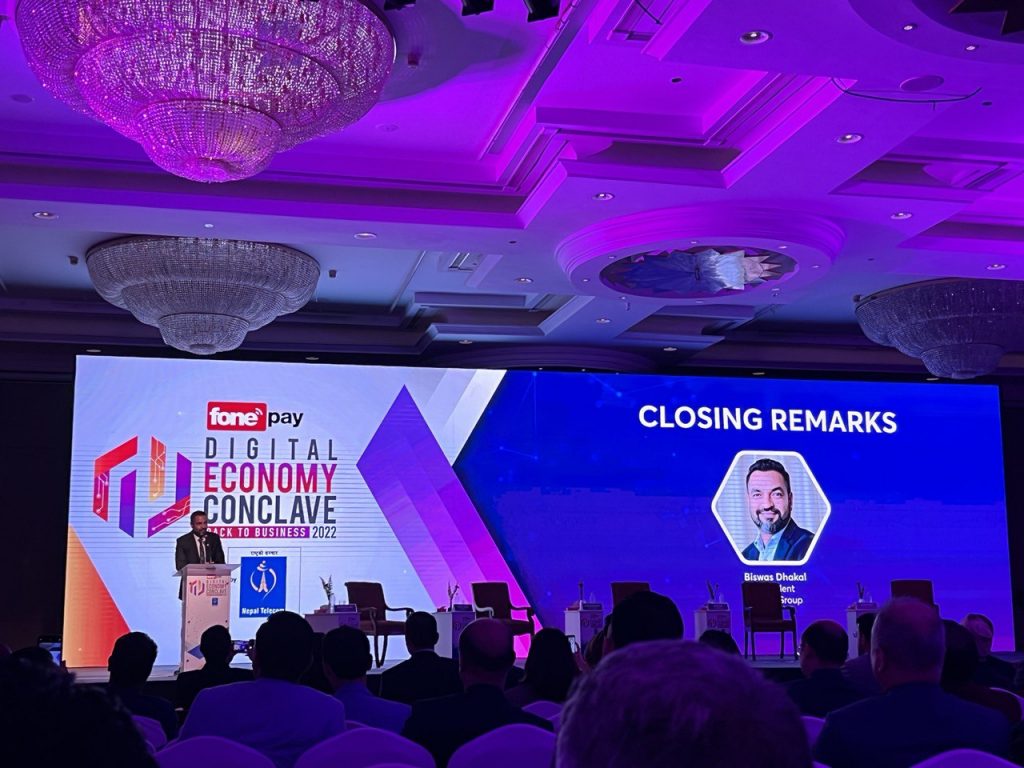FonePay Digital Economy Conclave 2022 took place on June 3, 2022, at Soaltee Hotel where four-panel discussions related to the impact of digital transformation on the businesses and the economy, along with the future prospects were held.
Organized by Brandworth Pvt. Ltd. in collaboration with FonePay, this event was attended by the selected participants including the Ministers, Governor, corporate leaders, media, and various dignitaries.
The main purpose of this conclave was to hold discussions on some futuristic ideas to make Nepal prosperous by strengthening the business ecosystem that has been hampered by Covid-19 and adopting digital technology on a larger scale.
FonePay Digital Economy Conclave 2020; A Quick Flashback on the First Edition
The first FonePay Digital Economy Conclave was held in November 2020. Unlike this year, the first edition had 8-panel discussions where the sessions revolved around digital infrastructure, eco-system, and Digital Nepal Framework.
After the turmoil of Covid-19 on businesses in Nepal, the conclave was organized in the presence of policymakers, top ICT experts, industry leaders, bankers, entrepreneurs, media, business owners, and other concerned attendees.
The panel discussions were made on the following 8 topics:
- Key Session: One Goal of Digital Nepal
- When will Nepal become digital?
- The race is on (Card and Digital Payments)
- Digital Remittance; The cost of moving money
- Digital Banking: Bank 4.0
- In-line or On-line
- Facilitating Digital Marketplace
- e-learning; Going Back to School
After all these panel discussions, it concluded with the need for infrastructural development and a conducive legal framework for the development of the IT and business sector.
It is remarkable that the second edition of the FonePay Digital Economy Conclave started with the progress reports on the digital economy
Minister of Communications and Information Technology Gyanendra Bahadur Karki gave his inaugural keynote speech at the event where he presented the progress in the governance and private sectors in terms of digital adaptation. He remarked the goal of a government is in ensuring transparency, reliability, and easy access for the public to the government services could only be attained by digital transformation.
Considering this fact, Nepal Government has given high priority to the infrastructural development of the technology and ICT sector overall, being the formulation and implementation of the Digital Nepal Framework as a primary concern.
According to him, there is rapid progress in the establishment of a full-fledged data center in Singhadurbar for integrated government services, and the integrated Disaster Recovery Centre in Hetauda.
It is noteworthy that more than 90% of government payments have already gone digital in the past two years. Similarly, the National Payment Gateway has also been developed to streamline all the government payouts and revenue collections.
Also, he stressed that the Nepal government has also plans in progress to spread the internet lines even to the sea levels.
He also ensured all the attendees that whatever conclusion being drawn in the discussions would be documented and considered by the Ministry of Communications and Information Technology for future reference in utmost priority.
Visa too agrees to extend its technological and infrastructural support in the expansion of digital finance services
The Group Country Manager of VISA for India and South Asia, Sandeep Ghosh gave his keynote speech where he admired the considerable leaps that Nepal has taken in case of digital transformation.
Visa has been operating in Nepal for over 25 years and the payments landscape is undoubtedly at an inflection point that has embarked on the journey of digitalization.
He listed the foundational features of digitization that are necessary for a truly visible digital transformation:
- Connectivity in real-time
- Security at industrial strength
- Resilience at scale
- Convenience
- Transparency for enhancing trust
- Inclusivity without the boundaries
He also stressed that in order to attain all these qualities in the digital systems, Nepal requires a true public-private partnership which could also help cover the huge costs associated with it.
On behalf of the card leader in over 200 countries for the last 75 years, Visa, Ghosh shared,
“Visa is ready to help Nepal by providing the required technical assistance in the field of payments with all the partners in achieving a truly digital Nepal. By deploying the sophisticated systems of Visa, it would enable faster time-to-market process and optimize the investment units make in Nepal.”
He also believes that Nepal has the right intent, framework, and commitment to develop the digital economy and succeed in the journey.
He also suggested the audience consider the 4 D’s to attain the goal of a digital economy in Nepal:
- Digital Sandbox for enabling innovation
- Digital Financial Literacy Center with Public-Government-Private Partnership
- Digital teams and departments in the government and financial systems
- Digital funds for incentivizing people for digital adaptation and other requirements
Governor Maha Prasad Adhikari and his applauding remarks on the digital progress; What is NRB doing from its side?
Governor Maha Prasad Adhikari too gave his keynote speech, reflecting upon the previous edition where he was asked- “When will Nepal become Digital?” in the panel discussion.
This time, he replied with the progress that has taken over the fintech ecosystem in terms of QR payments, RTGS transactions, and the growth of digital banking.
According to him,
“If any policy reform through these kinds of discussions has taken place much quick, it is none other than in the digital payments systems and digital economy.”
He gave credit to the payment systems in Nepal that are the real drivers of digital payments and notified that NRB is just an enabler that supports the private sectors like the banks and payment systems to maintain the pace of the Digital Economy in Nepal.
He also stressed that along with enabling digital payment systems, NRB is also going to develop the Central Bank Digital Currency with a proper study on this matter. And he asked for the required suggestions for implementing this at the national and regional levels.
He further added,
“There is no doubt that in the future, the brick-and-mortar form of banks could be converted into digital banks, for which the foundation is a digital currency.”
Session 1: Changing times, changing economy
Being moderated by Dipendra Chaulagain, Director of Sambridhhi Foundation, the participants in this panel discussion were Dr. Neelam Dhungana, Deputy Governor, NRB; Mahesh Acharya, Joint Secretary, Economic Policy Analysis Division, Ministry of Finance; and Uttar Khatri, Joint Secretary, Ministry of Communications and Information Technology.
The moderator reflected upon the huge leap that Nepal has taken in terms of the digital economy where more than Rs 3 billion of daily transactions are being carried out in a single payment system like Fonepay.
On being asked about the progress in the Digital Nepal Framework, Panelist Uttar Khatri replied that the Digital Nepal Framework has been in the implementation phase with a committee under the responsibility of the Ministry of Communications and Information Technology which aims to develop 8 core areas through 80 activities.
Under this, the significant progress is the establishment of integrated data centers in :
- Singhadurbar
- Hetauda
- Kohalpur
- Khumaltar, Lalitpur
Also, panelist Mahesh Acharya added that the service sector has more than 61% share of the GDP of Nepal. In this scenario, digital adaptation has fostered its growth even more. He reflected that he has been receiving a salary directly from the bank for more than 15 years. Also, the government has plans to increase financial transactions through the banking sectors moreover, through digital mediums.
He hinted at the need for a Utility Corridor in order to bolster the development of digital infrastructures like ducts for internet fibers, electricity lines, cable transmission lines, etc.
On being asked how the NRB is responding to the changing need of the market and business scenario, Dr. Neelam Dhungana responded that NRB has already given more than Rs 15 billion in interest subsidies for 10 types of loans to the businesses via the banking sector in this fiscal year. Even the restructuring and rescheduling of the business loans were provided in the Covid-19 period to incentivize them.
She added that during the Covid-19, due to physical restrictions, bank account holders have been increased. Similarly, the RTGS transactions have increased by more than 143% in the last year.
With the tremendous growth of more than 400% percent QR transaction volume within a year, even NRB has been able to reduce the issuance of new paper currency due to the digitization of payments.
However, the questions over Cryptocurrency were lightly addressed
On being asked about what the market can expect from NRB in terms of Bitcoin and Cryptocurrency, Dhungana replied that it is better if we prepare the legal frameworks and required infrastructures for this before jumping over increasing the transactions of digital currencies like Bitcoin.
She shared,
“As it is not backed by any security, there are risks associated with it. The central banks all over the world are concerned about that and are preparing for a pilot study. NRB too has set up a study committee to see the possibilities and challenges in adopting the Central Bank Digital Currency. However, it will take time to fully accept the digital currency.“
On being asked about the policy reforms in FDI for fintech and financial inclusion, she recalled the recent announcement in Nepal Budget 2079/80. There, the minimum threshold of receiving FDI in Nepal has been reduced to Rs 2 crore from the previous Rs 5 crore limit.
In the case of financial inclusion for the deprived sectors, there are various directives for the BFIs to provide the incentivized loans to them. For the differently-abled, there is a directive for the banks to open ATMs that are differently-abled-friendly.
Session 2: Creating Impact That Lasts
This session was moderated by Siddhartha Raja, Senior Digital Development Specialist, World Bank. The panelists were Bahar Kumar, Director, Impact Hub, Kathmandu; Dori Nguyen, Managing Partner, Utopia Kathmandu; and Ruchi Pandey, Sr. Director, Public Relations and Corporate Communications, Fusemachines Inc.
The moderator started by acclaiming the huge impact being seen in the field of technology and its ripple effects in the business spectrum, mostly budding start-ups.
Relating to this, Bahar Kumar shared about her business incubation venture Impact Hub.
She said,
“The opportunity we are seeing is that young people are so much exposed to the business through easy access to the technology. However, the existing education system is not necessarily providing them with the platform to practice and the job market isn’t actually engaging them as they want to be. Thus, Impact hub provides enabling environment for the young innovators by scaling up their digital skills and providing them support for prototyping in a community-based setting.”
Adding on to this, Dori Nguyen shed some light on how her urban venture studio Utopia is preparing entrepreneurs for building urban tech companies, Minimum Viable Products (MVPs), and helping them get the very first 100 customers, along with creating a regional path for them to scale in different cities and globally.
Also, on behalf of Fusemachines, Ruchi Pandey shared about the role of AI in creating high demanding careers and helping businesses to thrive by enabling automation.
All the panelists agreed that the startups in Nepal have quickly adopted digital payment systems during and after the effect of Covid-19.
Session 3: Nepal: Small Market or Unlimited Possibilities
Moderated by Janardhan Baral, President at SEJON, this session was attended by the panelists Ashutosh Tiwari, Founder, SAFAL Partners; Ram Krishna Khatiwada, CEO, NIFRA; Shree Baba Pokhrel, Economist and Vidushi Rana, Executive Director, Goldstar.
The moderator shed some light on the market size of the $4 trillion GDP size of Nepal. Nepal has international trade relations with more than 166 countries and it imports from 156 countries. In this light, how can we say that Nepal is a small market? Are there any sectors that we have overlooked by chance?
To address these questions, panelist Ashutosh Tiwari opined that we need to roll our sleeves to explore the opportunities in international trade either through cost minimizations or quality maximization. Trade is the only way to increase the Per Capita of Nepal.
Also, he stated the need for an “army” of diplomats to search for a competitive advantage of Nepali products or services which could be exported on a larger scale across the globe.
Ram Krishna Khatiwada too added that in terms of digital economy, Nepal has a huge potential to grow into a developing economy. The concept of sharing economy can bring economies of scale to the IT sectors in Nepal.
He further added the practice of defining SEZ as just the manufacturing industrial units should be also shifted towards IT sectors as well and NIFRA is also seeking opportunities to invest in these emerging sectors.
Shree Baba Pokharel shared her views from the economist perspective,
“Digital Economy is just a part of the larger economy. We should tap the potential by growing basic infrastructures like road, electricity, internet, etc. that support the development of overall economy in the bigger picture.”
Panelist Vidushi Rana stressed that there is a huge potential for growing the economy by creating local jobs and incentivizing the import substituting industries. However, the policy reforms should be in favor of these import-substituting industries to unleash the opportunities from the global market.
Session 4: When Will Nepal Have a Unicorn?
Moderated by the celebrated CEO of Nabil Bank, Anil Keshary Shah, this interesting session revolved around the remarkable discussions between the panelists Hem Raj Dhakal, Managing Director IME Group; Bidhyabaridhi Sigdel, Managing Director, Dolma Impact Fund; Lokesh Todi, Chairman, Avasar Equity Limited; and Usha Khatiwada, CEO, NRN Infrastructure and Development Limited.
The talk kicked off with a clear description of the concept of “Unicorn” and how all the panelists perceived the meaning of it. Panelist Usha Khatiwada pointed out the global standards of being a unicorn business which are:
- Should have a valuation of at least 1 billion dollar
- Having 80% of the capital in software, 7% in hardware, and the rest in others
- B2C model
- Should be privately owned
- Should be the first mover in its domain
Sharing the global data, Lokesh Todi said that there are about 101 unicorns in the SAARC region (100 in India and 1 in Bangladesh). In order to become a unicorn, that particular entity must solve international or local level problems. He further suggested that the start-ups should go for equity investments than debts.
On being asked about the investment scenario for start-ups in Nepal, the Dolma Impact Fund Director, Bidhyabaridhi Sigdel revealed that the entire value chain in private equity investments is missing somewhere in Nepal. According to him, multilevel funding is still difficult in Nepal since private equity firms are still in a nascent phase. And there is a requirement of a vibrant private equity in Nepal for the development of unicorns in Nepal
Panelist Hemraj Dhakal shared that the common bottleneck problems for the start-ups in Nepal are the lack of consistency in the owners and the urge to create a significant impact. He also addressed that there is a need for a cohesive environment to develop these budding start-ups so as to make them unicorns in the days to come.
Back to Business; Fonepay Digital Economy Conclave is Not Just a Talk Event

Yes, it has already been proven by the first edition of the Fonepay Digital Economy Conclave in 2020 that it is not just a talk event. The major discussions and conclusions drawn over that discourse were duly implemented at large within a year.
The visible signs of progress are NRB allowing an international payment gateway through Dollar card, the development of apps like Namaste Pay, and Nagarik app, and the infrastructural setup for National Payment Switch under NCHL.
This year too, these discourses have opened up various prospects and suggestions for the improvement to accelerate the growth of digital transformation even to the grassroots levels of the country. Let us hope that the policymakers, private sectors, consumers, and the overall market will be a part of this to attain the goal of the digital economy much sooner than expected.
You can refer to the article below to know about the first edition of the Digital Economy Conclave that happened in 2020.
Also read: Fonepay Digital Economic Conclave: Initiating Buzz and Paving Roadmaps for Digital Nepal



